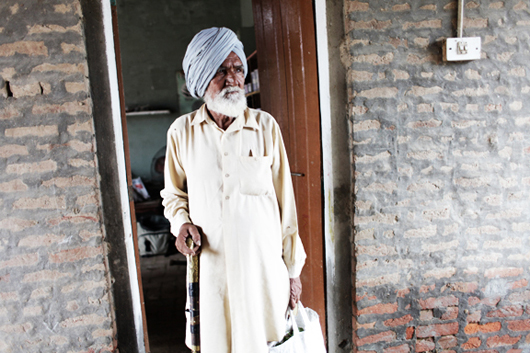We were in Punjab last year, trying to get our heads around the immensity of the issues in the area while enjoying the wonderful room service!
We had been working with the the amazing Umendra Dutt and the Kheti Virasat Mission. Driven by the teachings of Guru Nanak, the founder of Sikhism, KVM are stimulating impressive change throughout the agricultural communities of Punjab.
The legacy of the so called green revolution has devastated not only the state's natural environment but also people's social and cultural identities.
No one till now has been able to offer the farmers an alternative to their chemical based, company controlled farming systems. Many told us that chemical based farming was like taking drugs. The feeling at first is really good, it's different to anything you have ever experienced, but then you need more, want more... and then there is nothing left. Everything seems dead and the only thing you have left is a chemical dependency.
KVM has started to return the Punjabi farmers to a balanced and natural farming system using multi-cropping and organic pesticides and fertilizers. A system that works with nature not against it. By using traditional systems, and then enhancing them, farmers have been able to dramatically increase their yields.
Farmers are now beginning to realise that they had been conned and the green revolution was little more than an agricultural experiment by the government and corporates to control and manipulate the agricultural commodity markets. From around 50'000 Rupees per crop per hectare before the green revolution to between 10'000 to 15'000 Rupees, their incomes have dropped dramatically. Much of this is a result of the farmers having to now pay for all their external inputs, seed, fertiliser and pesticides where as before with a system of mixed cropping, indigenous seed and natural fertiliser the input were almost zero.

Of all the farmers we met, Amarjeet Sharma was by far the most philosophical and most progressive. He has not only returned to a traditional organic system, but is working with other farmers to develop and enhance what already exists as their agricultural heritage. All his fertilizer is produced at home using natural products like cowdung and milk preparations and what few pests he has to deal with are removed with natural extracts using cow urine, neem and chilly, all produced on his farm.
This film is about Amarjeet Sharma and his deep understanding of his environment and the future of agriculture.
Amarjeet Sharma

Charanjeetkaur, Amarjeet's wife.
Amarjeet's father-in-law.
a natural system and an agricultural Philosophy from the source project on Vimeo.



































